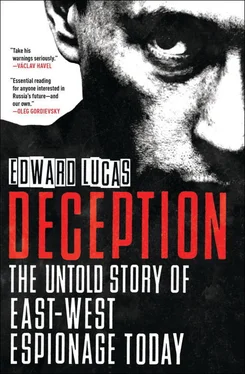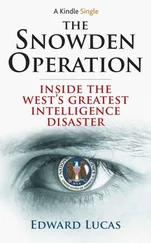Aficionados of ‘Future Studies’ believe that it offers organisations useful tools for analysing the future. Critics dismiss it as ‘bullshitology’ – a caricature of management expertise, laden with buzzwords, clichés and impenetrable jargon, both sententious and unfalsifiable. But in a country like America where management expertise is a kind of lay priesthood, its practice gave Heathfield access to the secrets of the confessional. When Bill Sharpe heard of Heathfield’s arrest, he realised what ‘jolly good cover’ his contributor’s role would have been:
Once you’re in an organisation doing that kind of work they give you absolutely everything… they put you in touch with other people in the area, take you to meetings. They share all their thinking.
Another business associate says Heathfield’s sales pitch, always to people at the top, was, in effect, ‘I have created a black box that helps you mitigate risk and plan for the future.’ They merely had to tell him their secrets and fears. Heathfield’s software product was professionally designed by a reputable company at substantial cost. But was it any good? Like much other expensive material bought by business executives, the data produced by Heathfield’s software may have been less a real tool for decision-making than ammunition for boardroom battles. Among the experts he showed it to was Yaneer Bar-Yam, a physicist and the founding president of the New England Complex Systems Institute, who politely describes it as a ‘working prototype’ rather than a breakthrough:
The specifics of the model he showed me were more of a conceptual sketch than an implementation of fundamental mathematics… a mock-up – on the lines of ‘this is what it would look like if it works’. It’s another thing to have something that really works. 15
Stripped of its jargon, the software pictured priorities and approaches inside an organisation, with the aim of getting people with different viewpoints to work together. Heathfield’s intern, who used the software for a university project, remembers it less than fondly:
It had very few capabilities – it was essentially a long-range calendar with a few bells and whistles. We were students and wanted to appease our professor, so we used it in a study on the hydrogen economy 16… it didn’t have much utility. The interface was impossible: buggy, jerky, hard to zoom in and out. 17
Despite its flaws, the software may have been designed to provide its promoter, not its users, with insights. Jerome Glenn of the Millennium Project, a UN-linked outfit that ponders the future with help from forty ‘nodes’ around the world, recalls meeting Heathfield exhibiting his software at a conference in 2007. Keen to see his product used at the prestigious project, Heathfield offered it free of charge. Mr Glenn also found it unsatisfactory and did not want to spend time learning to use it. Heathfield was indefatigable, returning every two or three weeks to press his case and ultimately offering to provide an intern, whom he paid $500 a month in order to promote the software inside the project. Even that was not enough to clinch the deal.
But his consulting work provided a good vantage point. ‘It’s a smart strategy to monitor the think tanks that monitor global change,’ says Mr Glenn. Had he known that Heathfield was a Russian he would have taken immediate steps to have the software checked, he says. 18The advantages for a spy of having a proprietory programme installed on important people’s computers in places ranging from Iran (where the Millennium Project has a ‘node’) to Beijing barely need stating. Even if the software is initially innocuous, an ‘update’ can deliver a piece of malware (malign code) that could copy emails, search a computer or a network for key-words, upload files to a remote server, or steal passwords. Leaving electronic espionage aside, Heathfield’s work also provided a laissez-passer to business, academia and government. A case study cited in his published chapter involved:
a group of graduate students at the Elliott School of International Affairs at George Washington University working under the guidance of Leon Fuerth, a research professor and former National Security Advisor to Vice President Gore. The concept of ‘Forward Engagement’ put forth by Professor Fuerth focuses on identifying major future contingencies that are likely to affect the long-term future of the United States. Those contingencies, from the aging of the US population to catastrophic terrorist acts, have important implications across multiple domains, from environment and energy to international relations. Dealing with those contingencies will require a proactive forward engagement by the US government. In order to make legislators aware of the implications of these major societal developments and to build the momentum for appropriate decisions among the public, a ‘big picture’ of future challenges must be constructed first. 19
It is easy to see how useful such access would be. Students involved in such a project would be prime recruitment targets: the sort of people likely to move onwards and upwards in America’s defence, security and foreign policy establishment. Faculty members at Georgetown would also be well worth getting to know, in order to tap their past government experience – or their future roles. Mr Fuerth is a well-connected figure in Washington, DC. His version of events is as follows:
Heathfield introduced himself to me at the conclusion of a speech that I gave at a public meeting in Washington. He expressed his interest in the subject of Forward Engagement, presented himself as an entrepreneur vending his own software for long-range assessment in corporations, and requested an opportunity to see me to continue the discussion. We met from time to time, whenever – as he claimed – he was in Washington on business. He volunteered to let my students work with his software to see if it helped their assignment for my class. His description of the work that my students were doing looks accurate. However, as I recall, their judgment was that, while the concept of Heathfield’s software was interesting, the software itself had very limited capabilities insofar as their end-of-semester project was concerned.
Heathfield’s personality was low-key and friendly, and he appeared to be seriously interested in the subject of foresight and how to develop and use it. Eventually, however, I learned that he was presenting himself as someone who had played an important role in developing Forward Engagement. At that point, I made it clear that this should stop, and he dropped out of touch. Heathfield is not and never was a ‘partner.’ He was one of many persons with parallel interests, whom I have gotten to know as the result of my work in this field… Heathfield played no part in the development of these ideas. 20
Mr Fuerth may well have had little time for Heathfield. But the Russian spy’s bosses were clearly interested in Mr Fuerth. He appears to be the person named as ‘Cat’ in encrypted communications to Heathfield from the Moscow headquarters of Russia’s Foreign Intelligence Service. They encouraged him to continue cultivating the source. 21However in this case the main role played by Mr Fuerth and the George Washington University may have been in bolstering Heathfield’s credentials, rather than in active intelligence gathering. His long-term mission may have been to move closer to the national-security world – always the prime target in Russian eyes. Professor William Halal of Techcast, a forecasting outfit, used to see Heathfield regularly during his frequent trips to Washington, DC. ‘He tried to meet anyone who was doing anything of consequence,’ he recalls. 22Heathfield also discussed with him a planned move to the American capital, with every sign of seriousness. That would have given him better access to companies that sell defence- and intelligence-related products and services. But the most tempting target could have been the think-tank world: the soft under-belly of the American security and intelligence community, where retired officials, those hoping for jobs, and those taking a break from government mix and mingle with outsiders.
Читать дальше












